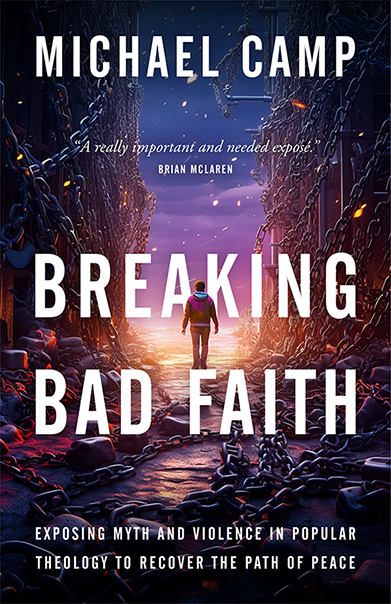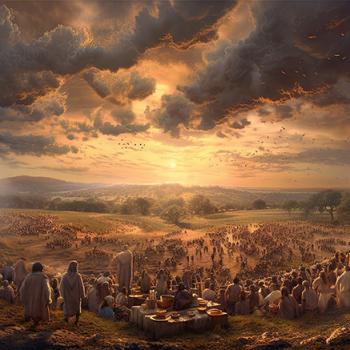
On July 4, 2023, my new book, Breaking Bad Faith: Exposing Myth and Violence in Popular Theology to Recover the Path of Peace (Quoir) will go on sale on Amazon. It reveals how bad faith—belief in a duplicitous, retributive, and violent god—is entrenched in today’s popular theology and American culture. It exposes 12 major myths that most conservative Christians (and some liberals) mistakenly believe that are mostly tied to a retributive-god paradigm.
The book shows how many well-meaning believers actually follow violent sacrificial religion rather than the original path of Jesus. Our two-faced, transactional, and retaliatory god contrasts with Jesus’ forgiving, restorative, and non-violent divine Dad or Father.
With sympathy for some readers’ predicament, the book shows them how to break the bad faith habit. Its examinations of both ancient and modern models of restorative justice and peacemaking will help many rediscover Jesus’ subversive way of peace. What’s more, it’s not necessary to stay inside what most people think of as “Christianity” to walk on this path. The book shows readers how this way can rescue humanity from retributive paths that are embedded in today’s religion and politics.

Why I Wrote Breaking Bad Faith
When I was in the process of deconstructing evangelical theology years ago, I noticed a pattern. All the major doctrines and beliefs that one finds necessary to deconstruct all connect to retribution and violence. Things like, original depravity of humankind, which says we all deserve to be punished. And, substitutionary atonement, which says Jesus takes our place being tortured and murdered on a Roman cross to appease God’s wrath. Or the infallibility of the Bible, which makes God a two-faced deity. The doctrine forces believers to accept that God at times during history did the following: drowned the whole planet, ordered the Israelites to totally destroy Canaanite populations without mercy, including non-combatants, the elderly, women, children, infants, and the unborn, ordered a system of reciprocal violence, and instituted capital punishment for a variety of crimes (many having nothing to do with murder). Other beliefs include the notion that God is transactional—that he often demands some form of punishment or violent act (e.g. corporal punishment of children) to restore people. Included also is the teaching that we are in the end times and the return of Christ in final judgment is coming soon. Finally, the ultimate retributive belief is that anyone who doesn’t measure up will go to a burning eternal conscious torment. I show how all of these are examples of violent sacrificial religion that negatively impact how people act in “church” or live in society. This way of looking at God and how he/she works in the world is extremely harmful. It needs to be broken.
Unpacking the Book of Joshua and Our Justification of Violence and War
The book unpacks the Canaanite Conquest that God supposedly ordered the Israelites to do. There is no getting around this. The god of Joshua orders the Israelites to commit genocide. This God is not even prolife. This revelation blows you away when you carefully dissect these narratives and are honest about what they clearly state. Especially Joshua 7, where this god ordered Joshua to execute a man (Achan) and his family because he disobeyed the specific orders that God gave. Despite Achan quickly confessing to the crime and showing some remorse, he is stoned and burned… along with his innocent children! Only then did God turn from his fierce anger.
The other thing the book does is challenge us over the impacts these theological beliefs have on us, the way we live, and the way our society operates. Look forward to a history lesson on American wars. You’ll learn some disturbing practices and consequences in our gun culture and our punitive methods of trying to solve evil and wrongdoing in society.
The Counter Myth of the Restorative God
The second half of the book uncovers the restorative God that other parts of the Bible describe. God actually had mercy on Cain, the first murderer. God forgave Joseph’s brothers and restored the family even though his siblings plotted to murder him and sold him into slavery. The prophets often advocated for “mercy not sacrifice” and critiqued the violent, transactional, sacrificial system. The ultimate counter myth is Jesus totally rejecting the show-no-pity, eye-for-eye, tooth-for-tooth, and life-for-life reciprocal violence narratives. He tells people to love their enemies and have mercy because the true God is merciful and kind to the ungrateful and wicked.
When we give ourselves permission to critique and deconstruct the Bible—something the prophets, Jesus, Paul, and the earliest students of Jesus did—then something beautiful happens. The restorative justice narratives jump out at us. The path of peace comes into focus. Jesus calls us to a way of life (not a religion called Christianity) that forgives, loves, and works to restore ourselves and lost people to harmonious relationships. Salvation isn’t a ticket to heaven nor a get-out-of-hell-free card. It’s pursuing good news, love for humanity, and a restorative, non-violent way of life that saves us from cycles of retribution and violence.
Examples of Restorative Justice
Finally, the book describes some really encouraging ways to deal with evil in our society that are restorative. Besides instances when notable Christians have done this, the book explores other examples outside of Christianity. Like other countries’ new ways to design prison systems, the story of a secular black man who peacefully helped blatant racists change their minds, a Jewish couple who showed kindness to an anti-Semite extremist and converted him to Judaism, and a Muslim couple who essentially did the same. They helped a bitter, Muslim-hating Iraq War veteran experience a profound transformation.
Mark your calendars on July 4th—Independence Day—to get this book that can help you set yourself free from the harmful elements of bad faith and discover a peaceable, non-religious way. Subscribe to this blog to get updates and the Amazon link to the book.
“Breaking Bad Faith is a book our fractured society desperately needs right now.” ~ Heather Hamilton, author of Returning to Eden
“I appreciate Camp’s work in Breaking Bad Faith because he fearlessly rakes through our theology to discover the good and expose the bad…”
~ David Hayward, the NakedPastor and author of Flip It Like This.
_____________
Michael Camp tends the Spiritual Brewpub, which helps disillusioned or post-evangelicals (or “nones”) uncover historical facts and insights that help them deconstruct, rethink, and rebuild a more authentic faith or philosophy of life. He is the author of Breaking Bad Faith: Exposing Myth and Violence in Popular Theology to Recover the Path of Peace (Quoir), which releases on July 4, 2023 on Amazon. To get updates and read other themes in the book, subscribe to this blog. To get specific help deconstructing conservative Christianity and rebuilding healthy faith, see Michael’s Religious Deconstruction Workshop. To hear fascinating interviews with leading voices in the deconstruction community, listen to the Spiritual Brewpub Podcast.














